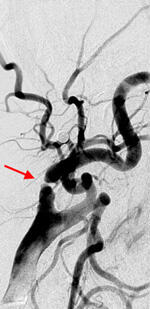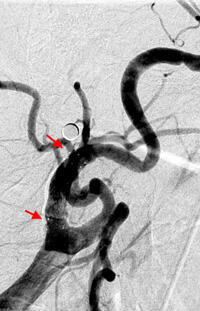Many people are unaware that approximately 30 percent of strokes are caused by blockages in the carotid artery. Carotid artery disease is a condition characterized by a narrowing or blockage of one or both of the carotid arteries in the neck, which supply blood to the brain. Plaque, which is made up of an accumulation of fats, cholesterol, and fibrous tissue, can build up in the arteries over time, as a result of age, genetics, or an unhealthy lifestyle. The team of specialists at Stony Brook Medicine utilizes a multidisciplinary approach to diagnose and treat stroke and pre-stroke conditions, many of which are caused by a narrowing in the carotid arteries. We offer both nonsurgical and traditional treatment options. Specialists from cardiology, vascular surgery, and neurology work together to care for you and your family with compassion and expertise.
What is it?
Stroke is the leading cause of serious, long-term disability in the United States, and occurs when there is an interruption of blood flow to the brain that is caused by a blockage or bleeding in the brain. A stroke that is caused by a blockage, which is the most common type, is called ischemic (more than 90% of cases); one caused by bleeding is called hemorrhagic. When the blood supply to a part of the brain is interrupted, brain damage can occur in minutes. High blood pressure, high cholesterol, diabetes, and smoking increase the risk of stroke. Sometimes a "mini stroke," or transient ischemic attack (TIA), occurs instead; in this case, stroke-like symptoms occur, but there is no lasting damage. Living a healthy lifestyle — eating a balanced diet, exercising regularly, and quitting smoking — helps lower the risk of a first stroke and TIA or will help prevent another one from occurring. If a stroke does occur, it can have debilitating effects, and effective treatment followed by rehabilitation becomes essential to maximize recovery. Symptoms of stroke include:
- Partial loss of vision in one eye
- Weakness, tingling, or numbness in one arm and/or leg
- Temporary loss of control of movement in one arm and/or leg
- Inability to pronounce words or speak clearly
- Unsteadiness, vertigo, double vision, or drop attacks (sudden falls)
- Difficulty swallowing
- Memory loss
- Loss of balance
- Personality or mood changes
- Drowsiness or loss of consciousness
- Uncontrollable eye movements or eye drooping
Both carotid artery disease and peripheral arterial disease, which occurs when plaque builds up in the arm or leg arteries instead of the carotid arteries, can be asymptomatic, but both are risk factors for stroke and must therefore be managed carefully.
Services
The stroke and carotid artery disease-related services we provide include:
- Imaging. To diagnose narrowing or blockage in the carotid arteries, we offer: carotid duplex and transcranial Doppler ultrasound, CT scan, and magnetic resonance angiography.
- Medication consultation. Sometimes drugs that reduce the blood's ability to clot — anticoagulants — or drugs that inhibit the ability of platelets to stick together — antiplatelet medications — are helpful in preventing stroke.
- Balloon angioplasty and stent placement. This is a non-surgical alternative to treat carotid artery disease. We use small tubes and catheters that go from an artery in the groin to inject dye into the carotid artery. Once the magnitude or severity of the blockage has been determined, a small balloon with a mounted stent is positioned across the blockage. The balloon is inflated and the stent expands opening the blocked artery. The stent remains in place, embedded in the surface of the artery. The stent helps prop the carotid artery open, allowing normal blood flow to the brain.
The following are before and after photos of a blocked carotid artery that was opened by a carotid stent procedure.


Our Team
The Stony Brook Medicine team is here to make you and your family's experience as smooth and as comfortable as possible. High-quality, compassionate care in a state-of-the-art environment is what our patients have come to expect — and what you should demand.
The Stony Brook Difference
The cardiologists at Stony Brook Medicine bring decades of experience and knowledge to the table. As a result, we are the destination of choice for many patients and referring providers in the area and beyond. We are known for our ability to treat even the most complex cases that other hospitals are not able to handle. Patients often arrive in the morning and are discharged the following morning: it's as simple as that. Our expertise with less invasive treatments allows for shorter stays and more efficient treatment.
We also offer an extensive selection of clinical trials, which allows many patients who are otherwise unable to be treated, to receive alternative care options. Our researchers are extremely talented and our research results are published in major, scientific journals.

